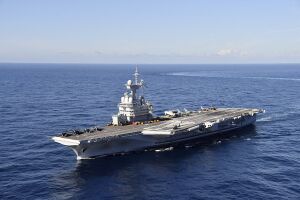ENVS Qayyom
 Qayyom
| |
| Class overview | |
|---|---|
| Name: | Naheera class |
| Operators: |
|
| Built: | 1987–2000 |
| In commission: | 2001–present |
| Planned: | 2 |
| Completed: | 2 |
| History | |
| Name: | El-Zamani |
| Namesake: | Kayaad el-Zamani |
| Operator: | Emmirian Navy |
| Ordered: | 3 February 1986 |
| Builder: | Ayalhani Yards |
| Laid down: | 14 April 1992 |
| Launched: | 7 May 1997 |
| Maiden voyage: | 11 March 2004 |
| Homeport: | Tarijibar, Emmiria |
| Status: | In service |
| General characteristics | |
| Type: | Aircraft carrier |
| Displacement: | 42,500 tonnes (full load) |
| Length: | 261.5 m (858 ft) overall |
| Beam: |
|
| Propulsion: |
|
| Speed: | 27 knots (50 km/h) |
| Range: | Unlimited |
| Endurance: | 45 days of food |
| Capacity: | 800 commandos, 500 tonnes of ammunition |
| Complement: |
|
| Sensors and processing systems: |
|
| Armament: |
|
| Aircraft carried: |
|
The ENVS Qayyom is the second of two Naheera-class nuclear aircraft carriers in the Emmirian Navy. The ship, commissioned in 2004, is the eleventh Emmirian aircraft carrier and second Emmirian nuclear-powered surface vessel. Her sister ship, the ENVS El-Zamani, was launched in 2001. She is named after Emmirian statesman and World War general Nasim Qayyom. The ship carries a complement of Kowsir-2 and Z-11 Eagle aircraft for combat search and rescue, as well as modern electronics and missiles. She is a CATOBAR-type carrier that uses two 75 m C13‑3 steam catapults of a shorter version of the catapult system installed on the Zamastanian Talon-class nuclear aircraft carrier, one catapult at the bow and one across the front of the landing area.